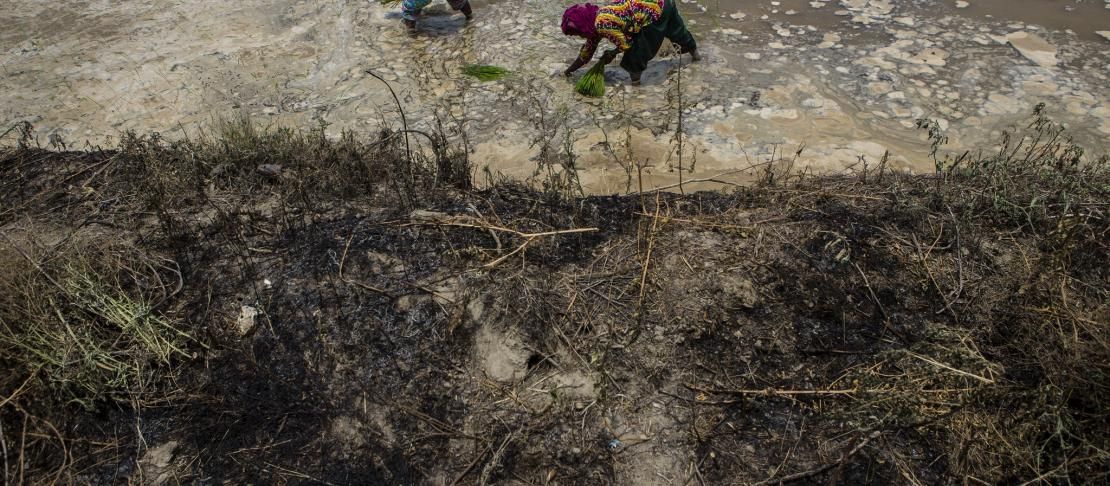World Water Week - Workshop on Managing Change: Strengthening resilience to climate and disaster risks

A workshop co-convened by CCAFS will discuss climate and disaster resilience in the context of sustainable development.
The combined effects of unresolved poverty and unsustainable development together with a changing climate contribute to persistent and increasing disaster risk. Key development drivers include population growth, rapid urbanisation, increasing demands for energy and food, and increasing industrialisation. As disaster impacts are often manifested through flooding or drought, water management, in synergy with other policy areas, plays an important role in building resilience. Important milestones in global policy-making will occur in 2015, including decisions on sustainable development goals, climate change and disaster management. Strengthening and maintaining resilience to climate and disaster risks is vital for sustainable development and this must progress from concept to practice. How policy can effectively bridge this gap is an important question. Building resilience in the face of global challenges urgently needs better integration between efforts addressing development objectives, climate change mitigation and adaptation, and disaster risk reduction and management in the Post-2015 development agenda.
This workshop is part of the World Water Week, and is organised by the Stockholm International Water Institute (SIWI). Co-conveners are CCAFS, UNESCO, The Rockefeller Foundation and the World Bank's Global Facility for Disaster Reduction and Recovery. Discussions will revolve around a framework for managing change coupled to policy approaches to achieve this. Case studies that integrate resilience to disaster and climate risk through management of water and energy resources will be highlighted.
Workshop sessions
Session 1: Conceptual Framework for Managing Change.
Establishing and maintaining resilience to climate and disaster risks is vital for sustainable development. What steps are needed to integrate resilience building into development?
This session looks into adaptive responses and management strategies to flood and drought at the municipal, national and international level. This session will identify measures needed for implementation to reduce losses from floods and droughts.
Session 2: Policy Approaches to Managing Change
Strengthening resilience to climate and disaster risks must progress from concept to practice. How can policy effectively bridge this gap?
Through a series of case studies, this section discusses policy approaches to strengthening climate change resilience at the local and regional level.
Session 3: High Level Panel Discussion on Strengthening Resilience to Climate and Disaster Risks.
From concept to policy to practice – how can we best move forward?
This session will help formulate the actions needed to enhance resilience and implementation of national and local plans aimed at reducing existing risks from floods and droughts. The panellists will discuss lessons learned with decision makers and other stakeholders on implementing disaster risk reduction (DRR) and climate measures, and how to improve coherence between water resources management, DRR and climate measures. The panellists will also review policy aspects of the post-2015 disaster risk reduction framework endorsed by the Sendai DRR conference and discuss how water should be addressed in the UNFCCC COP 21 outcome.
Workshop Time Schedule
Time | Session Presentations/Discussion | |||
09:00 – 10:30 | Session 1: Conceptual Framework for Managing Change Chair: Dr. Phil Graham Moderator: Dr. Anil Mishra | |||
09:00 – 09:05 | Introduction – Dr. Phil Graham/ Swedish Meteorological and Hydrological Institute | |||
09:05 – 09:20 | Keynote: Integrating financial and structural disaster risk management to foster resilient development in a changing environment – Prof. Upmanu Lall, University of Columbia | |||
09:20 – 09:30 | Building Climate Resilience: Adaptive responses to urban flooding across scales – Dr. Marcus Moench, ISET‐International | |||
09:30 – 09:40 | Flood and drought risk: Differences, similarities and strategic management – Mr. Paul Sayers, Environmental Change Institute, Oxford University. | |||
09:40 – 9:50 | The Role of Infrastructure and Governance in Adaptation – Dr. Jerry Delli Priscoli, World Water Council | |||
9:50 – 10:00 | Enhancing Community Resilience to Climate Change: Models, Approach and Practices – Mr. Rafiqul Haque, Shushilan | |||
10:00 – 10:06 | Poster pitch Moderator: James Clarke, International Water Mangement Institute
| |||
10:06 – 10:30 | Discussion | |||
10:30 – 11:00 | Coffee Break | |||
11:00 – 12:30 | Session 2: Policy Approaches to Managing Change Chair: Ms. Karin Lexén Moderator: Ms. Angela Churie Kallhauge | |||
11:00-11:05 | Introduction – Ms. Karin Lexén, Stockholm International Water Institute | |||
11:05-11:20 | Keynote: From local to global: Leveraging policy frameworks to promote resilient development – Ms. Shyla Raghav, Conservation International | |||
11:20-11:30 | Resilience to Climate and Disaster Risk: Bangladesh Context – Prof. Mohammad Habibur, Dept. of Civil Eng., BUET | |||
11:30-11:40 | Lake Cyohoha catchment: Enhancing climate resilience of communities and ecosystems – Mr. Kidanemariam Jembere, Global Water Partnership‐Eastern Africa | |||
11:40-11:50 | Enhancing Drought Resilience in the Horn of Africa – Mr. Gerald Kairu, Global Water Partnership Eastern Africa | |||
11:50-12:00 | Renewable energy for strengthening climate resilience.– Mr. Divyam Nagpal, International Renewable Energy Agency | |||
12:00-12:06 | Poster Pitch Moderator: Ms. Vanessa Meadu
| |||
12:06-12:30 | Discussion | |||
12:30 – 14:00 | Lunch | |||
14:00 – 15:30 | Session 3: High Level Panel Discussion on Strengthening Resilience to Climate and Disaster Risks Chair: Dr. Fred Boltz Moderator: Ms. Sundaa Bridgett-Jones | |||
14:00-14:05 | Introduction – Dr. Fred Boltz, Rockefeller Foundation | |||
| Panel members:
| |||
14:05-14:35 | Panel Opening Statements | |||
14:35-15:20 | Discussion | |||
15:20-15:30 | Wrap-up | |||
15:30 | End of Workshop Session |